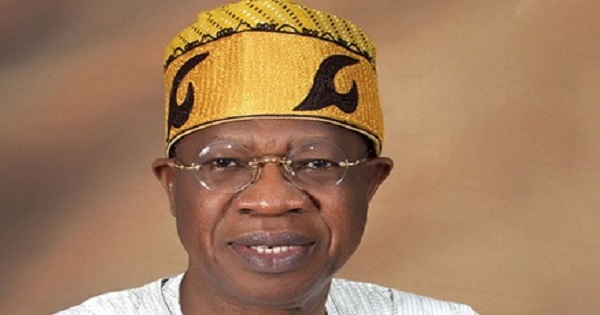Broadcasting
FG Slams N100, 000 Fine on Local Brands Running Adverts on CNN, Others

Federal government said that it will impose a fine of N100,000 each time any Nigerian brand that create their adverts abroad but broadcast them on CNN and other international stations broadcasting in Nigeria.

Lai Mohammed
The government also said that local brands which run adverts during foreign matches must compulsorily advertise during Nigerian Premier Football League games.
Lai Mohammed, minister of Information and Culture, who stated this on NTA’s ‘Good Morning Nigeria’ programme on Monday, said this was one of the rules included in the Broadcasting Code which has been rejected by many in the industry.
Mohammed, also said that measure was the only way to help the local league thrive.
He said, “Let’s assume you have brought in La Liga, and during the matches, Guinness is advertised, we will compel you, we will compel Guinness to also advertise when we are playing a local league. That is the only way we can grow this industry but as can be expected, we have had very few supporters.”
He said in the event that the brand wants to run the advert on a local station like NTA, the brand would pay a N100,000 fine each time it is broadcast.
Mohammed added that adverts promoting Nigerian brands must be directed and authored by Nigerians inside the country.
The minister said “If you do an advert in South Africa, you put it on CNN and we look at that advert and we see that the advert was not made in Nigeria but actually made in South Africa, or you see that five times a day, it is on CNN, you pay half a million to us. The half a million will go to the Content Development Fund.”
He further stated that the NBC had been asked to implement a regulation mandating exclusive licensees and broadcasters to share exclusive rights with other broadcasters.
Mohammed said this policy would ensure that Multichoice would no longer have the monopoly of broadcasting the English Premier League.
The minister added, “What is common today is to see products made in Nigeria but the advert for those products are actually probably done in South Africa or in the US. So, we amended the code to say that if a product you want to advertise in Nigeria territory is made in Nigeria, grown in Nigeria or processed in Nigeria, then you must make sure that the advert is also produced in Nigeria.
“Gulder is made, processed in Nigeria. If you go to South Africa to produce an advert which you are going to air to Nigerians because Nigerians consume Gulder, what we have amended the code to say is that for every time that advert is aired in Nigeria either on radio or television, you pay a fine of N100,000. We are not stopping you from making your production in America or South Africa but if you are going to advertise in Nigerian territory, you will pay a fine of N100,000.
“In other words, if Gulder makes an advert in South Africa and it is shown on NTA, if it shows it 10 times a day, it will pay N100,000 fine 10 times.”
Mohammed stated that if any Nigerian company invests in a foreign league, the firm must invest at least 30 per cent of that money in Nigerian football.
“We went further to say that if a company should invest $1m in bringing EPL to Nigeria, that company must also be ready to spend 30 per cent of that $1m in producing a local content along the same line.
“In other words, if Maltina or Guinness decides to bring in EPL, which is English football, we have no problem with that. But they must also invest in covering our local league to the tune of 30 per cent of what he has paid,” the minister said.
Mohammed argued that until the anti-competitive and monopolistic tendencies are expunged from the broadcast sector, Nigeria would not be able to grow local content.
“The NBC has issued about 30 pay-TV licences but only one is managing to survive. Why? Because of these anti-competitive and manipulative tendencies of these foreign companies,” he said.
Broadcasting
How Flavour’s Uplifted Album Changed the Game: 15 Years of Igbo Pride and Global Hits

Fifteen years ago, something truly special dropped onto the music scene: Flavour N’abania’s second album, Uplifted. This was a first showcase of his talent. With powerful vocals, masterful highlife production, and a deep connection to his cultural roots, Uplifted solidified Flavour’s reputation as a gifted artist.

At the time of its release, Uplifted smashed through borders and cultural divides, all thanks to Flavour’s deep commitment to celebrating his Nigerian roots, especially his Igbo heritage. This powerful connection to his culture has made him a major force, not just in Nigeria, particularly in the East, but also among the Igbo community dotted around the world.
The sheer success of Flavour’s cultural expression is highlighted by Spotify data from Uplifted and his other tracks. Even though his songs are deeply rooted in his culture and often sung in Igbo, they’re getting massive plays all over the globe.
Uplifted itself has stayed a big deal on streaming platforms, with its standout tracks racking up some serious numbers. Among the most-streamed hits from the Uplifted album are Ashawo Remix, Adamma, and Oyi (I dey Catch Cold). These tracks, along with other timeless fan favourites like Time To Party, Nwa Baby (Ashawo Remix), and Game Changer (Dike) have all contributed significantly to Flavour’s overall streaming success, proving their lasting appeal. Reflecting on the album’s anniversary during an exclusive chat with Spotify, Flavour revealed that for him, “Adamma” truly captured the essence of Flavour from the Uplifted album era.”
From the heart of Nigeria to global playlists: Flavour’s universal pull
Flavour’s music really does have a universal pull. His songs have popped up in over 2 million user-made playlists, which shows just how much people are connecting with and sharing his tunes. And get this: in the last three years, from 2022 to 2024, Flavour’s music has seen a growth in streams, a total stream increase of 134% globally, and a 573% increase across Sub-Saharan Africa.
While 51% of his total audience is in Nigeria, his influence stretches far and wide with the USA, UK, Canada, South Africa, and France all among his top listening countries. That’s a truly global footprint, reaching across Africa, Europe, and America.
Leading Flavour’s listenership in Nigeria is a strong showing from Lagos, accounting for 38% of his Nigerian audience. The Federal Capital Territory (FCT) and Rivers State also follow closely, making up 22% and 16% respectively, together claiming 76% of his Nigerian audience. He also enjoys love in the east as two Eastern Nigerian cities, Enugu and Onitsha, break into his global top 10. Big international cities like Greater London, Johannesburg, and New York City feature prominently too. This wide geographical spread shows how his music crosses all sorts of borders.
Who’s listening? A look at Flavour’s fanbase
Flavour’s audience is diverse with Gen Zs (18-24 year olds) as his biggest fans globally and across Sub-Saharan Africa. This strong youth appeal is vital for his long-term success. While his music celebrates women, men form the majority of his listeners globally (57%) and in Sub-Saharan Africa (63%).
The lasting success of Uplifted highlights how digital streaming has completely changed the music industry. Platforms like Spotify have given artists like Flavour ways to connect with fans everywhere. These days, streaming data gives us a clear, numbers-based look at an artist’s reach, showing that Flavour’s cultural stories, delivered in fluent Igbo, truly resonate far beyond Nigeria’s borders.
Flavour’s strong link to his Igbo roots, seen in his music, has driven his global success, acting as a cultural bridge for Nigerian traditions. The ongoing popularity of Uplifted and his other songs on streaming platforms proves that genuine cultural expression, mixed with great artistry, ensures lasting success today. As Uplifted hits 15 years, it showcases the power of culture worldwide.
Broadcasting
Nigeria Week Ahead: CBN decision, ECB and USD in focus

By Lukman Otunuga, Senior Market Analyst, FXTM
This will be a week defined by high-impact events and corporate earnings from the largest companies in the world.

Nigeria’s central bank is expected to hold interest rates on Tuesday.
This decision is likely based on still stubbornly high inflation despite price pressures easing in recent months. Inflation slowed to 22.2% year-on-year in June, its third consecutive decline. A CBN rate cut could be on the cards in H2, but this will be on the back of persistently falling price pressures.
Looking at the NGX All Share Index, it has gained almost 10% month-to-date – pushing 2025 gains to nearly 30%. This means the NGX is currently outperforming the S&P500 and Nasdaq100 who have gained roughly 7% and 11% this year respectively. The Naira spot has held its ground against the USD this year after depreciating almost 70% in 2024.
Outside of Nigeria, earnings season is in full swing with US banks reporting strong results last week. Now the spotlight shines on big tech with Alphabet and Tesla reporting on Wednesday.
Alphabet shares gained 14% in Q2 amid strong AI product demand and growth in the cloud business. However, bulls may need a fresh catalyst to push Alphabet’s year-to-date gains out of the red. Tesla is down almost 20% year-to-date and could extend losses if its latest quarterly results are below market expectations
On the data front, key releases from Europe, the United Kingdom, Japan, and the United States may influence global sentiment.
But the main event for FX markets could be the European Central Bank decision on Thursday. No changes are expected to interest rates, but any clues offered on future moves could spark fresh volatility. Traders are currently pricing in a less than 50% probability that the ECB cuts rates by September
Speaking of FX, the dollar has weakened across the board with the DXY tumbling toward 97.70. This weakness could be based on mounting pressure from Trump to cut US rates and caution ahead of the tariff deadline on August 1st.
Note: Nigeria faces a 14% reciprocal tariff on its goods imported into the U.S, effective from August 1st.
Broadcasting
Big Brother Naija Season 10 to Premiere July 26 with Record ₦150m Grand Prize

MultiChoice Nigeria, today announced the highly anticipated return of Africa’s biggest reality television show, Big Brother Naija, for its landmark 10th season. Set to premiere over two nights on Saturday, July 26 and Sunday, July 27, 2025, the new season promises 10 weeks of captivating drama, strategic gameplay, and unparalleled entertainment, culminating in the grand finale on Sunday, October 5, 2025.

The audition process for this milestone season was meticulously designed to unearth the most engaging and dynamic personalities from across Nigeria. Audition registrations were held from May 3rd to May 7th, 2025, and saw an overwhelming response, followed by rigorous in-person auditions conducted in Lagos, Abuja, and Enugu from May 16th to May 18th, 2025.
Speaking on the upcoming season, Busola Tejumola, Executive Head, General Entertainment, MultiChoice Group, expressed her excitement: “Today we are not just announcing another season, we are celebrating a legacy.”
While the official theme for Season 10 will be unveiled on the premiere night, viewers can anticipate a fresh wave of excitement. The beloved Ebuka Obi-Uchendu is returning as host, guiding viewers through every twist and turn of the season. This 10th season also has the highest prize at stake – valued at a whopping N150million.
Fans can catch the premier live on July 26 and 27 exclusively on Africa Magic Showcase, Family and Showmax at 7 PM WAT. The Sunday live eviction shows will also air exclusively on these channels. The 24/7 live stream will be available on DStv Channel 198, GOtv Channel 49, and on Showmax.
“BBNaija has become more than just a television show; it is a living, breathing cultural force. It has given voice to a new generation of talent, creatives, entertainers, and the influencer community, and it has refined what homegrown entertainment can achieve when it is done at scale with intention and ambition,” added Tejumola.
With a two-night opening live show for Big Brother Naija Season 10, the season is poised to build upon the legacy of its predecessors, with fans expecting a more dynamic and entertaining experience. Still speaking on what the season holds Dr. Tejumola said “Today we are not just announcing another season, we are celebrating a legacy. From the very first time we introduced Big Brother Naija in 2017, we had an inkling that we had something special. What we couldn’t fully imagine then is how deeply the show would resonate not only in Nigeria but across Africa and in the global diaspora, where our stories continue to connect people to home.”
This milestone season for the iconic show is not without the usual lineup of sponsors. The gold sponsor for the 10th season of the show is Guinness Nigeria. Other sponsors include Smirnoff, Gordons, HFM, Pepsi, Aquafina, Supakomando, Tolaram Group, Bet King, Golden Penny Foods, Haier Thermocool, Checkers custard, and Innoson Motors, among others.
Viewers can catch all the live action and special broadcasts on DStv Channel 198, GOtv Channel 49, and Showmax. The live Sunday eviction shows will air exclusively on Africa Magic Showcase (DStv Channel 151, GOtv Channel 8), Africa Magic Family (DStv Channel 154, GOtv Channel 7) and on Showmax.
DStv and GOtv subscribers can also watch the show on the go using the DStv and GOtv Stream apps available on the Google Play Store and IOS App Store.

 E-Financial3 days ago
E-Financial3 days agoUBA’s LEO Becomes Africa’s First Chatbot to Enable Cross-Border Payments

 News3 days ago
News3 days agoUN Appoints Sa’id, Nigerian to Nuclear Panel

 E-Business3 days ago
E-Business3 days agoNIMC Enrolls 122m for NIN, Cuts Extortion by 40 Percent

 Telecom2 days ago
Telecom2 days agoMTN Nigeria Rewards 1,500+ Winners with ₦290m in Mega Billion Promo

 Telecom3 days ago
Telecom3 days agoMTN Urges Nigerian to Regards Telecom Infrastructure as National Assets

 General News3 days ago
General News3 days agoAppeal Court Nullifies Registration of ‘KPMG Professional Services’

 E-Financial2 days ago
E-Financial2 days agoNaira Slides Again, Hits ₦1,532.34/$ Despite CBN’s Dollar Push

 Telecom3 days ago
Telecom3 days agoBitget Launches $6M Global Crypto Trading Contest with New Competitive Segments


























